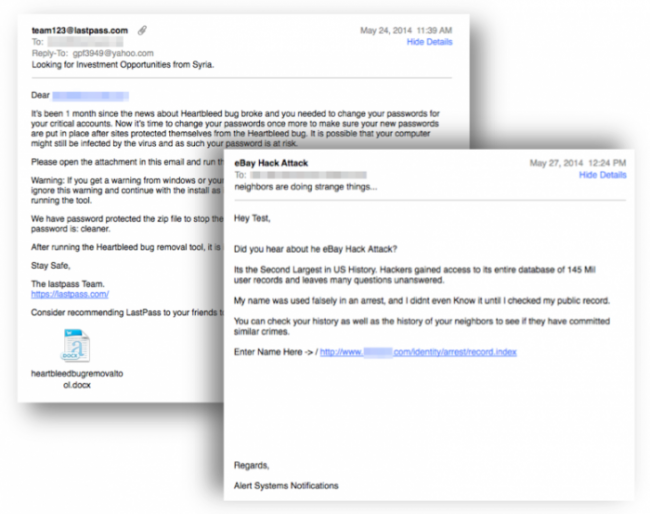Spammers and attackers in both email and SMS were quick to redouble their efforts this quarter. In our
2014 Q2 Global Messaging Threat Report, we take a look at some of these various new trends popping up around the world. Comically, email phishers were quick to exploit the Heartbleed exploit without using the exploit. Deploying a common tactic for email spammers, they instead chose to leverage Heartbleed’s publicity to scare victims into compromising themselves. Similar methods were promptly adopted following the eBay data breach. A few examples:

In the realm of SMS spam, south Florida was known for many years for sending one of the United States’ most abundant forms of spam, “We buy junk cars!” This bilingual campaign seems to have disappeared in 2014, but it’s quickly been replaced with yet another south Florida-based campaign that tops the U.S. spam charts — “free” cruise offers. Of course, nothing in life is free. Would-be cruise goers must trade their time in the form of a timeshare sales marathon followed by a dubious set of fees associated with taking the “free” cruise. While not as fun as a cruise, it’s been interesting to sit back and watch the spammers responsible slowly devolve their message into arguably unreadable levels in an attempt to evade filtering:
You and 1 other person are going to the Bahamas on us 813.515.1739
You just won 2 sea get-away tickets Call: eight:one:3:five:one:five:1:7:9:3
Great news, you have gain ed a Caribbean cruis,e for two, agents waiting: call: S,even Twoo Sev'en niine O>ne Four O:ne Sevenn Tw=o ninne
In the UK, action by a governmental regulator, the ICO, also directly impeded SMS spammers this quarter. Following a raid on several Wolverhampton offices and residences on May 22nd, officials seized equipment, documents and SIM cards that were used for sending over a million spam text messages. UK residents saw spam levels abate in the weeks following the raid with average spam levels dropping as low as 28 percent from those seen the day of the raid.

Unfortunately, intervention by law enforcement isn't a complete solution. Many spammers still remain on the virtual streets slinging their wares, and their affects are quickly filling the void left behind by this raid. For further analysis on these trends, Mexico's botnet-derived spam situation, and more, please visit our
14Q2 threat report.


